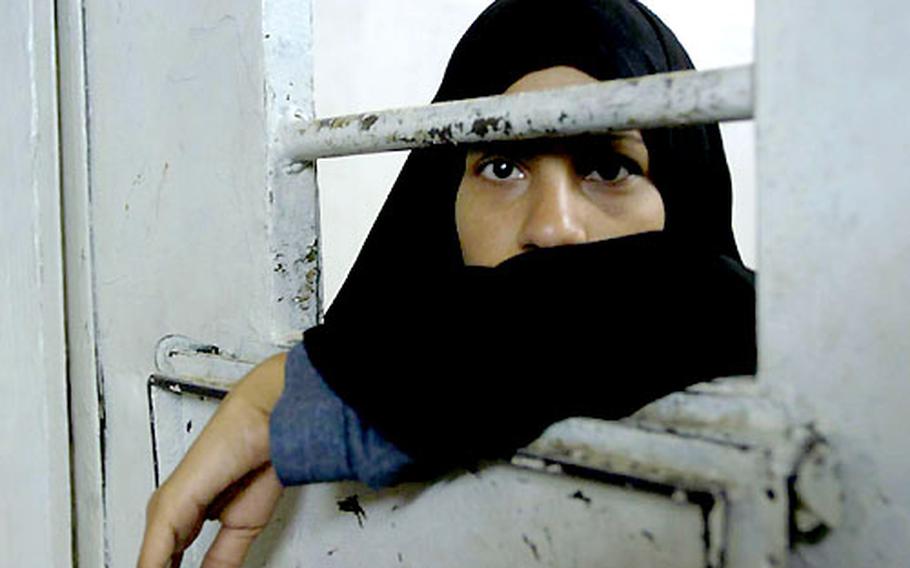
Iraqi prisoner Nidal Dadr, 17, awaits the outcome of her case in the Karbala jail after being arrested for kissing her husband in public. Her crime isn't a violation of new Iraq laws, but because she was arrested by Iraqi police her case must go before a judge before it can be dismissed. (Juliana Gittler / S&S)
KARBALA, Iraq — On a hot afternoon, Nidal Dadr sits in a small jail cell with a few scattered mats, waiting to see a judge.
The diminutive 17-year-old dressed in all black was charged with inappropriate behavior after kissing her husband in public, violating a nearly obsolete morality law in this region.
She shares her cell with four other women — three accused of murder and one of arms sales.
Nearby, 200 male prisoners sit in one of a few large, dim cells. Some are waiting to come before a judge. Others have been sentenced and are serving time.
It’s crowded and hot.
If the jail is dismal and coarse, it marks a vast improvement since pre-war days. U.S. Army military police have repaired the infrastructure and administration, adding paint and light and changing the way things are run. At the same time, soldiers and Marines are improving the region’s police, judiciary and legal systems.
The goal, Army officials say, is to prepare Iraqis for the U.S. military’s eventual exit.
“We just kind of help the system, teaching them to run a prison,” said Army 1st Lt. Antoine Brooks, from Menlo Park, Calif. He is a member of the Reserve 870th Military Police Company from Pittsburg, Calif.
When they arrived, the MPs found a dismal facility. It had war damage. It needed light and ventilation. MPs routinely found weapons and drugs in the cells.
Marines and soldiers started working on the structure. They added cross wire between the bars to prevent things from being passed off to prisoners. They taught the Iraqi guards to search visitors.
Prisoners complied and some now tell guards when one among them violates a rule.
“We haven’t had to go in in a week now. Before we had to search the cells daily, and we found weapons daily,” Brooks said. “They pretty much police themselves at this point.”
He applies a U.S. model for prison supervision by treating prisoners with respect. That helps maintain order and compliance.
The guards allow female prisoners privacy and provide anything specific they need for their care. Prisoners eat twice a day. They can keep money and buy more or different food if they like.
“I try to make it as easy for them as possible, with all of them,” Brooks said.
Progress made at the jail is echoed in the police and legal systems. The police were transformed from a distrusted force that made few arrests to a hearty, active force.
“The numbers of prisoners in the jail are testament to that,” said Army Capt. Curtis White, a reservist from the 304th Civil Affairs Brigade attached to the 1st Marine Expeditionary Force, which governs southern Iraq.
The prison population swelled from 30 when coalition forces arrived to 200 in early July.
White, from Willingboro, N.J., is an agent for the Drug Enforcement Agency back home. As a reservist, he’s been partnered with a fellow reservist and coincidentally another DEA agent, Marine Capt. Ezra Carbins, with the 3rd Civil Affairs Group attached to the 1st MEF.
The two have used their civilian and military backgrounds to forge a new public safety program for the region. They began a police academy to train new police and help keep the current force accountable.
MPs patrolled with Iraqis to encourage proactive policing. The Iraqi police now patrol and investigate on their own.
The system seems to be improving but the laws, like the national government, are still being formulated. Dadr’s case is an example.
Morality police probably picked up Dadr, and, Brooks said, the jail processes everyone the Iraqi police bring in to allow judges to make the final call.
Since Iraqi police officers brought Dadr in, her case must make its way through the system. Though they have no official authority, morality patrols hold sway in Karbala, one of Iraq’s most religious areas.
There is no question about the criminality of what most other prisoners are charged with: murder, grand and petit theft and weapons possession, among other things.
“The common crime is probably theft or looting,” Carbins said. “Pretty petty stuff.”
The system isn’t perfect. There’s no separate prison for those who have been convicted, so they live in the jail with those waiting to see a judge. And the Iraqi police force is still small and developing.
But for the city of 500,000 people, with four times that in the entire province, the process is moving steadily.
“It’s not the perfect system,” White said. “But it’s better than it was.”